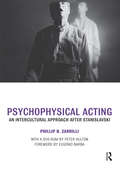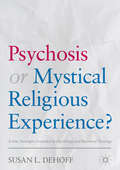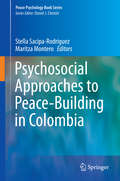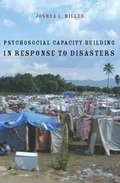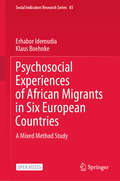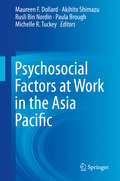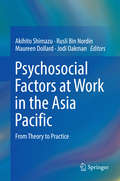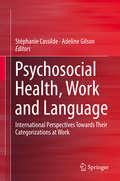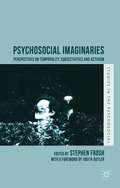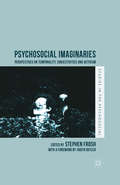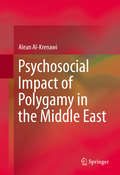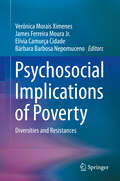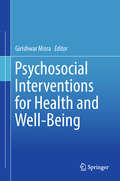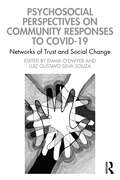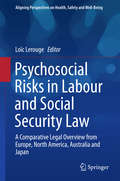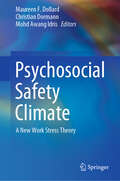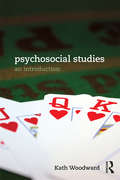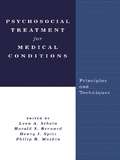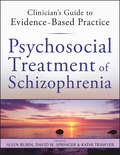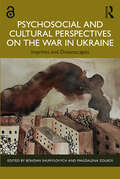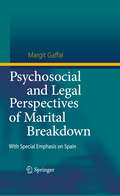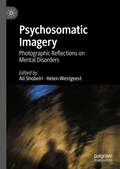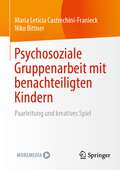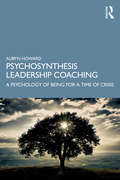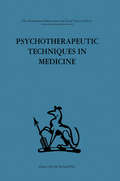- Table View
- List View
Psychophysical Acting: An Intercultural Approach after Stanislavski
by Phillip B. ZarrilliPsychophysical Acting is a direct and vital address to the demands of contemporary theatre on today’s actor. Drawing on over thirty years of intercultural experience, Phillip Zarrilli aims to equip actors with practical and conceptual tools with which to approach their work. Areas of focus include:an historical overview of a psychophysical approach to acting from Stanislavski to the presentacting as an ‘energetics’ of performance, applied to a wide range of playwrights: Samuel Beckett, Martin Crimp, Sarah Kane, Kaite O’Reilly and Ota Shogoa system of training though yoga and Asian martial arts that heightens sensory awareness, dynamic energy, and in which body and mind become onepractical application of training principles to improvisation exercises.Psychophysical Acting is accompanied by Peter Hulton’s downloadable resources featuring exercises, production documentation, interviews, and reflection.
Psychosis or Mystical Religious Experience?
by Susan L. DeHoffThis book presents a new paradigm for distinguishing psychotic and mystical religious experiences. In order to explore how Presbyterian pastors differentiate such events, Susan L. DeHoff draws from Reformed theology, psychological theory, and robust qualitative research. Following a conversation among multidisciplinary voices, she presents a new paradigm considering the similarities, differences, and possible overlap of psychotic and mystical religious experiences.
Psychosocial Approaches to Peace-Building in Colombia
by Maritza Montero Stella Sacipa-RodriguezThis edited volume summarizes the work of a research group, called Social Bonds and Cultures of Peace that accompanies and supports victims of socio-political violence in Columbia. The individual chapters focus on the ongoing violence in the Colombian context, a complex and dynamic area in which various groups (drug traffickers, national armed forces, guerrilla fighters, self-defence groups) have been engaged in organized violence for more than 60 years. Emphasis is placed on the psychological consequences of violence and various forms of psychosocial support that psychologists have been providing to the victims of violence. Central to their work is the notion of "accompanying" those who have been victims of violence, listening to them, engaging them in dialogue and working together to strengthen the resources of victims. The recovery of individual and collective memories of atrocities is discussed as an important avenue for healing and for the empowerment of individuals and groups. The solidarity among victims creates opportunities at the grassroots level to pursue truth, reveal perpetrators of violence, seek public acknowledgment and attain social justice. For perpetrators of violence and members of armed groups, the book addresses a host of psychosocial issues related to disarming, demobilizing and reintegrating former combatants, including children, into society. Throughout the book, in the spirit of peace psychology, the researchers are engaged in a form of praxis that is cognizant of the wider geohistorical context within which victims and perpetrators are embedded and the dialectical relationship between micro and macro-level events and change. Researchers in Latin American studies, peace psychology, social justice and transitional justice, will find this volume to be an excellent resource.
Psychosocial Capacity Building in Response to Disasters
by Miller Joshua L.Disaster responders treat more than just the immediate emotional and psychological trauma of victims: they empower individuals and families to heal themselves long into a disaster's aftermath. This requires helping survivors to rebuild their ability to meet their emotional and psychological needs, not only for themselves but also for others, which necessitates a careful consideration of survivors' social, economic, and political realities as their communities heal and recover. This comprehensive book integrates Western mental health approaches and international models of psychosocial capacity building within a social ecology framework, providing practitioners and volunteers with a blueprint for individual, family, group, and community interventions. Joshua L. Miller focuses on a range of disasters at local, regional, national, and international levels. Global case studies explore the social, psychological, economic, political, and cultural issues affecting various reactions to disaster and illustrate the importance of drawing on local cultural practices to promote empowerment and resiliency. Miller encourages developing people's capacity to direct their own recovery, using a social ecology framework to conceptualize disasters and their consequences. He also considers sources of vulnerability and how to support individual, family, and community resiliency; adapt and implement traditional disaster mental health interventions in different contexts; use groups and activities to facilitate recovery as part of a larger strategy of psychosocial capacity building; and foster collective grieving and memorializing. Miller's text examines the unique dynamics of intergroup conflict and the relationship between psychosocial healing, social justice, and peace and reconciliation. Each chapter ends with a mindfulness exercise, and a section reviews practitioner self-care.
Psychosocial Experiences of African Migrants in Six European Countries: A Mixed Method Study (Social Indicators Research Series #81)
by Klaus Boehnke Erhabor IdemudiaThis open access book provides an empirical account of the psychological and social experiences of 3500 African migrants to 6 European countries: Germany, Spain, Italy, The Netherlands, France, and the UK. It discusses the psychosocial motivations for migration from Africa, who migrates where, and stressful pre- and post-migration factors affecting the social and psychological wellbeing of migrants. The book also includes a detailed exploration of posttraumatic stress disorder (PTSD) and posttraumatic stress symptoms (PTSS) among African migrants. Addressing and offering solutions to pre- and post-migration problems in Africa and Europe as well as the problems associated with the perilous journeys involved, this unique study is a must-read for anyone interested in cross-cultural psychology and social science, and particularly in migration and mental health.
Psychosocial Factors at Work in the Asia Pacific
by Maureen F. Dollard Akihito Shimazu Rusli Bin Nordin Paula Brough Michelle R. TuckeyThe past several decades of rapid organizational change and global economic activity beseech a fresh understanding of work conditions and mental health across all nations and regions. This volume addresses psychosocial factors at work, legislation, frameworks, research innovations and common perceptions in the Asia Pacific countries. It presents new research on psychosocial factors at work from an Asia Pacific perspective, introducing exciting new research on workaholism, bullying, work-life balance and conflict, work demands classifications, and psychosocial safety climate. Insights regarding workplace psychosocial factors, worker health and well-being have evolved mainly within North American and European cultural contexts and developed industrial countries. This state of the art account of knowledge development in the Asia Pacific region will stimulate new insights for researchers and policy makers to improve the quality of workers' lives worldwide. "This very informative book highlights the significance and uniqueness of job stress problems encountered by workers of different countries in the Asia Pacific region. Occupational health researchers all around the world will find this book a great inspiration for future research. " Yawen Cheng, ScD, Institute of Health Policy and Management, Taiwan "Initiatives and interventions reported from collaborative projects present useful hints for filling gaps in policies and practices for managing psychosocial risk factors in diverse work-life situations in the Asia Pacific region". Dr. Kazutaka Kogi, President, International Commission of Occupational Health
Psychosocial Factors at Work in the Asia Pacific
by Akihito Shimazu Rusli Bin Nordin Maureen Dollard Jodi OakmanThe past several decades of rapid organizational change and global economic activity beseech a fresh understanding of work conditions and mental health across all nations and regions. This volume addresses psychosocial factors at work, legislation, frameworks, research innovations and common perceptions in the Asia Pacific countries. It presents new research on psychosocial factors at work from an Asia Pacific perspective, introducing exciting new research on workaholism, bullying, work-life balance and conflict, work demands classifications, and psychosocial safety climate. Insights regarding workplace psychosocial factors, worker health and well-being have evolved mainly within North American and European cultural contexts and developed industrial countries. This state of the art account of knowledge development in the Asia Pacific region will stimulate new insights for researchers and policy makers to improve the quality of workers' lives worldwide. "This very informative book highlights the significance and uniqueness of job stress problems encountered by workers of different countries in the Asia Pacific region. Occupational health researchers all around the world will find this book a great inspiration for future research. " Yawen Cheng, ScD, Institute of Health Policy and Management, Taiwan "Initiatives and interventions reported from collaborative projects present useful hints for filling gaps in policies and practices for managing psychosocial risk factors in diverse work-life situations in the Asia Pacific region". Dr. Kazutaka Kogi, President, International Commission of Occupational Health
Psychosocial Health, Work and Language
by Stéphanie Cassilde Adeline GilsonThis volume deals with the construction of categorizations of health at work on the basis of individuals' perceptions and analyses of the psychosocial health effects at their work. The volume approaches the subject from the point of view of those who have experienced psychosocial risks at work, either by being under constraints themselves or by being witness to such constraints. Each chapter sheds light on their representations by examining how the individuals label these constraints. The book compares official categorizations of psychosocial health effects of work to unofficial categorizations, built or expressed. It shows how taking into account subjective narratives may reinforce existing strategies. By giving a central place to language in the analysis of the representations of psychosocial health at work, the volume provides additional information about the various prevention and coping strategies that can be used for dealing with the issue. Beyond some international comparisons, the book covers various national case studies, including in Argentina, Belgium, Canada, Chechnya, France, Germany, the Netherlands, Japan, and Russia.
Psychosocial Imaginaries: Perspectives on Temporality, Subjectivities and Activism (Studies in the Psychosocial)
by Stephen FroshPsychosocial Imaginaries.
Psychosocial Imaginaries: Perspectives on Temporality, Subjectivities and Activism (Studies in the Psychosocial)
by Stephen FroshPsychosocial studies challenges the traditions of psychology and sociology from a genuinely transdisciplinary perspective. The book reflects this agenda in its varied theoretical and empirical strands, producing a newly contextualised and restless body of understanding of how 'psychic' and 'social' processes intertwine.
Psychosocial Impact of Polygamy in the Middle East
by Alean Al-KrenawiPsychosocial Impact of Polygamy in the Middle East is the first to deal with polygamy in the Middle East in a comprehensive way. This book fills a gap in the literature by addressing the question of the psychosocial impact of polygamy on all members of polygamous families by offering a new way of examining family structure, such as father-mother, father-children, mother-children relationships, and the relationships between offspring from different mothers. It introduces a model for intervention with polygamous families for scholars and practitioners. This book also explores Islam's role in polygamy as well as the social and economic consequences of the phenomena.
Psychosocial Implications of Poverty: Diversities and Resistances
by Verônica Morais Ximenes James Ferreira Moura Jr. Elívia Camurça Cidade Bárbara Barbosa NepomucenoThis book presents a multidimensional, psychosocial and critical understanding of poverty by bringing together studies carried out with groups in different contexts and situations of deprivation in Brazil, Mexico, Paraguay, Nicaragua and Spain. The book is divided in two parts. The first part presents studies that unveil the psychosocial implications of poverty by revealing the processes of domination based on the stigmatization and criminalization of poor people, which contribute to maintain realities of social inequality. The second part presents studies focused on strategies to fight poverty and forms of resistance developed by individuals who are in situations of marginalization.The studies presented in this contributed volume depart from the theoretical framework developed by Critical Social Psychology, Community Psychology and Liberation Psychology, in an effort to understand poverty beyond its monetary dimension, bringing social, cultural, structural and subjective factors into the analysis. Psychological science in general has not produced specific knowledge about poverty as a result of the relations of domination produced by social inequalities fostered by the capitalist system. This book seeks to fill this gap by presenting a psychosocial perspective with psychological and sociological bases aligned in a dialectical way in order to understand and confront poverty. Psychosocial Implications of Poverty – Diversities and Resistances will be of interest to social psychologists, sociologists and economists interested in multidimensional studies of poverty, as well as to policy makers and activists directly working with the development of policies and strategies to fight poverty.
Psychosocial Interventions for Health and Well-Being
by Girishwar MisraThis volume provides multifaceted and multidisciplinary insights into the growing field of health studies. Providing inputs from the behavioural sciences as well as social sciences, it discusses the issues of recovery from illness, and growth and wellbeing, as situated in social and eco-cultural contexts, and addresses the modalities of health-related interventions in diverse contexts. The specific themes taken up by the contributors are post-trauma growth, resilience, gender and health, distress and wellness, indigenous healing, counselling and psychotherapy, disability-related interventions, self-healing, as well as health issues of special groups like adolescents and the elderly, cancer patients and those suffering from other chronic illnesses. Till recently, the medical model has prevailed as the chief form of understanding health and illness. This has led to marginalization of the context, localization of all health and wellness components within the individual, and to biological reductionism. The contributions to this volume propose corrective measures and provide diverse approaches in a balanced manner. This volume is useful for researchers and practitioners interested in health studies, including the behavioural sciences, social work, medical anthropology, and public health.
Psychosocial Perspectives on Community Responses to Covid-19: Networks of Trust and Social Change
by Emma O’Dwyer Souza, Luiz Gustavo SilvaThis highly topical edited book documents the community response to Covid-19 across national contexts, exploring the widespread development and mobilisation of community initiatives and groups. It provides rich analysis of case studies from the Global North and South, including South Africa, the USA, India, China, Mexico, Brazil, Italy, Australia, the UK, Turkey, and Argentina. The Covid-19 pandemic motivated a significant community response globally, with the widespread development and mobilisation of "bottom up" community initiatives and groups. These community responses were an essential yet often unseen and unrecognised means by which people survived the pandemic. This book asks questions such as how were community responses to Covid-19 shaped by national, cultural and political processes and phenomena; how did community responses to Covid-19 interact with public policies, on health, education, and social welfare; and what are the likely political implications of the community response to Covid-19? Discussing the provision of abortion care in Latin America, the support to marginalized communities in Kolkata, and the mobilisation of carnival "krewes" in New Orleans, to give a few examples, the text adopts and develops a novel socio-cultural psychological approach, weaving together contributions from scholars working in diverse disciplinary fields. The text highlights the importance of integrating multiple levels of analysis, including psychological, sociological, and political/ideological, to investigate how communities respond to crises such as the Covid-19 pandemic, and how they can plan for and manage future crises. This is essential reading for academics and students in psychology and the social sciences, as well as policy-makers, charities, and third-sector organisations.
Psychosocial Risks in Labour and Social Security Law
by Loïc LerougeThis book studies a range of legal systems and compares them on their ability to deal with psychosocial risks at work. The book looks at prevention of psychosocial risks from a labor law perspective and at compensation and reparation from a social security law perspective. It pays special attention to the topic of bullying in the work place, which is currently the subject of most legal summons.This book presents the views on the subject from leading national and international experts and provides an in-depth coverage of legal systems used in Southern and Northern European countries, as well as Canada and Japan to deal with this topic. The topic of psychosocial risks at work has received much attention recently, both from the general public, the press, and those working in the legal arena. It is difficult for lawyers to deal with the issue of psychosocial risks at work due to the multifactorial and subjective features involved.
Psychosocial Safety Climate: A New Work Stress Theory
by Maureen F. Dollard Christian Dormann Mohd Awang IdrisThis book is a valuable, comprehensive and unique reference text on Psychosocial Safety Climate (PSC), a new work stress theory. It proposes a new PSC theory concerning the corporate climate for workers’ psychological health, its origins and implications for work stress, and provides a critique of current research and theories. It provides a comprehensive review of all PSC studies to date. The chapters discuss state-of-the-art empirical evidence testing PSC theory in relation to management roles, organisational resilience, corruption, organisational status, cultural perspectives, illegitimate tasks, high PSC work groups, PSC variability in work groups, etc. They investigate outcomes such as psychological distress, emotional exhaustion, depression, worry, engagement, health, cognitive decline, personal initiative, boredom, cynicism, sickness absence, and productivity loss, in various workplace settings across many countries. This unique book allows practitioners to rapidly update practical measures, benchmarks and processes, and provides students and trainees with an introduction to PSC and important concepts and methods, quantitative and qualitative, in occupational health with leads to further sources. Students as well as experts on occupational health and safety, human resource management, occupational health psychology, organisational psychology and practitioners, unions and policy makers will find this book highly informative. It covers relevant materials for undergraduate and postgraduate education, drawing upon the concepts, topics and methods (diary, multilevel, longitudinal, qualitative, data linkage) within the multidisciplinary occupational health area.
Psychosocial Studies: An Introduction
by Kath WoodwardThere is expanding global interest in the relationship between the psychological and the social. The bringing together of affect, emotion and feeling with social, political and cultural forces offers a creative, innovative and rich set of ways of understanding what Charles Wright Mills called the links between personal troubles and public issues. This book is an introduction to psychosocial studies. Drawing on different approaches to the field, the book introduces the main theoretical influences on psychosocial studies and their development and impact, through – for example – concepts such as the unconscious, self and identity, affect, emotion and the cultural and social unconscious. It explores the theoretical frameworks of psychosocial studies, and psychosocial research methods. The book offers examples of case studies which illustrate the diversity of psychosocial studies and what makes it distinctive. It asks: what is social about the inner worlds of the psychological? What is psychological and psychic about social worlds and social life? This clear, accessible introduction will be of interest to students and researchers across the social sciences and humanities, in particular in sociology, psychology, cultural geography, social policy and politics and cultural studies.
Psychosocial Treatment for Medical Conditions: Principles and Techniques
by Philip R. Muskin Leon A. Schein Harold S. Bernard Henry I. SpitzMental Health and Physical Health are undeniably connected. One cannot recover physically, if there is still mental suffering, and vice versa. The essays collected here examine the relationship between mental and physical health, and how that relationship flourishes or suffers in a managed care environment. Understanding more about how the psychological aftereffects of an illness, and the best ways to respond to them, will ultimately enhance the care offered to patients. The contributors offer a wide range of examples of linked physical and mental illnesses, with advice on how best to responsibly address and treat both.Clinicians and practitioners will welcome this guide to navigating a managed care system and working with patients to heal both their mental and physical maladies equally.
Psychosocial Treatment of Schizophrenia
by Allen Rubin David W. Springer Kathi TrawverPraise for the Clinician's Guide to Evidence-Based Practice Series"A major stumbling block to the adoption of evidence-based practice in the real world of clinical practice has been the absence of clinician-friendly guides suitable for learning specific empirically supported treatments. Such guides need to be understandable, free of technical research jargon, infused with clinical expertise, and rich with real-life examples. Rubin and Springer have hit a home run with the Clinician's Guide to Evidence-Based Practice Series, which has all of these characteristics and more."-Edward J. Mullen, Willma and Albert Musher Chair Professor, Columbia UniversityState-of-the-art, empirical support for psychosocial treatment of schizophrenia Part of the Clinician's Guide to Evidence-Based Practice Series, Psychosocial Treatment of Schizophrenia provides busy mental health practitioners with detailed, step-by-step guidance for implementing clinical interventions that are supported by the latest scientific evidence. This thorough, yet practical, reference draws on a roster of experts and researchers in the field who have assembled state-of-the-art knowledge into this well-rounded guide. Each chapter serves as a practitioner-focused how-to reference and covers interventions that have the best empirical support for the psychosocial treatment of schizophrenia, including:Cognitive behavioral therapyAssertive community treatmentCritical time interventionMotivational interviewing for medication adherencePsychoeducational family groupsIllness management and recoveryEasy-to-use and accessible in tone, Psychosocial Treatment of Schizophrenia is an indispensable resource for practitioners who would like to implement evidence-based, compassionate, effective interventions in the care of people with schizophrenia.
Psychosocial and Cultural Perspectives on the War in Ukraine: Imprints and Dreamscapes
by Magdalena Zolkos Bohdan ShumylovychThis innovative and important book explores how war imprints on culture and the psychosocial effects of war on individuals and societies, based on the first few months after the outbreak of war in Ukraine in 2022.The book approaches the conflict in Ukraine through the prism of creative and artistic material alongside scholarly analysis to highlight the multiplicity of subjective experiences. Essays are complemented by material from the ‘war diaries’, which comprise day diaries, dream diaries, artistic and poetic material composed by students and academics in February and March 2022. With chapters focusing on fear, ruptures and resistance, the book examines different aspects of subjective, cultural and embodied experiences of war. It examines elements that dominant perspectives of war often overlook; the quotidian, personal and emotive ways that war is registered individually and collectively in societies and cultures.Highlighting different narratives that illuminate the complex effects of war, this book is highly relevant for postgraduate students, researchers and advanced undergraduate students in the fields of cultural psychology, psychosocial studies, peace and conflict studies and cultural history.Chapter 4, Chapter 5, Chapter 7 and Chapter 10 of this book are freely available as downloadable Open Access PDFs at http://www.taylorfrancis.com under a Creative Commons Attribution-Non Commercial-No Derivatives (CC-BY-NC-ND) 4.0 license.To read the online archive of Two Months of War, please visit the Urban Media Archive of the Center for Urban History (Lviv, Ukraine): https://uma.lvivcenter.org/en/collections/178/interviews
Psychosocial and Legal Perspectives of Marital Breakdown
by Margit GaffalThe book provides a comprehensive overview of the psychosocial and legal aspects of divorce with special reference to the situation in Spain, addressing the grounds for divorce and its impact on parents and children. Theoretical approaches are applied that take into account the psychosocial conditions and the Spanish legislation. Subsequenty, an empirical analysis of preferred custody arrangements reveals some of the current problems that are associated with a joint custody regime. Lastly, the suitability of divorce mediation is examined within the framework of the Spanish legislation.
Psychosomatic Imagery: Photographic Reflections on Mental Disorders
by Helen Westgeest Ali ShobeiriThis book explores the potential of specific photographic images for reflecting on experiences of mental disorders. Instead of looking at photographs of (people suffering from) mental disorders, this volume aspires to comprehend the complexities of such conditions through photographic lexicons, metaphors, and practices. For this book, a mental disorder is not to be seen as a dysfunction or impairment, but a state in which the sustaining balance of stable and unstable mind is unsettled, which may induce mental/bodily disturbances. The term “psychosomatic” refers to the interaction of the mind (psyche) with the body (soma); it refers to their co-dependence. By the term “Psychosomatic Imagery” this volume refers to a distinctive trope of photographic images that deal with the body-mind interaction during the states of mental disorders. This novel theoretical framework in photography theory instigates critical discussions about the experiences of mental disorders visualized as disturbed corporeal and mental perceptions of the world. While the introduction of the volume unpacks and assesses the applications of photography in mental disorder studies from theoretical and historical perspectives, the chapters focus on specific cases of Psychosomatic Imagery in contemporary photography. Those cases include, but are not limited to: PTSD, hysteria, paranoia, psychosis, bipolar disorder, and Hikikomori.
Psychosoziale Gruppenarbeit mit benachteiligten Kindern: Paarleitung und kreatives Spiel
by Maria Leticia Castrechini-Franieck Niko BittnerDer in diesem Buch vorgestellte Ansatz - " Together We Are Strong" bzw. T-WAS - ist eine Form der präventiven Gruppenarbeit mit benachteiligten Kindern zur Stärkung ihrer Resilienz. Die Methoden beruhen primär auf der Entwicklung von Objektbeziehungen, indem die Kinder in fortlaufenden kreativen Spielen neue Erfahrungen mit sich selbst im Verhältnis zu anderen machen. Dabei werden kreative Spiele, wie sie im pädagogischen Bereich üblich und auf Teamarbeit ausgerichtet sind, mit therapeutischen Elementen aus der Gestalttherapie und der ontologischen Psychoanalyse ergänzt, um die Dimensionen der Ich-Stärkung und der Aggressionsbewältigung zu erarbeiten. Besonders hervorgehoben wird die Rolle des Gruppenleiters als interdisziplinärer Paarleitung, der das Spannungsfeld ihrer persönlichen Unterschiede bewusst nutzt, um die Gruppe in Bewegung zu bringen. T-WAS wurde in drei verschiedenen Flüchtlingsunterkünften auf der Basis von wöchentlichen 90-minütigen Gruppeninterventionen durchgeführt. Mehr als 70 Kinder haben daran teilgenommen und einen stabilen Zustand des emotionalen Wohlbefindens erreicht, während sich ihre sozialen und schulischen Leistungen verbessert haben.
Psychosynthesis Leadership Coaching: A Psychology of Being for a Time of Crisis
by Aubyn HowardPsychosynthesis Leadership Coaching responds to the call of coaches who want to be able to work with the whole person, with the inner as well as the outer worlds, and not just at rational and behavioural levels but at emotional and spiritual levels as well. Psychosynthesis is unique amongst psychologies in the emphasis it places on self and will at the centre of human psychological functioning. This holistic and integrative psychology provides the foundations for working with leaders in ways that respond to today’s emergent crises. Psychosynthesis coaching is an increasingly popular approach that is finding its way into the mainstream as a response to the needs of coaching to engage at depth with emotional content and in the transpersonal realm of meaning, purpose and values. This book introduces psychosynthesis coaching to a wider audience and provides a comprehensive guide to this approach for both coaches and leaders. This book provides the context, models, methods, skills and techniques for coaches to engage with their clients within the larger context of Self and Will, alongside working on inner and outer agendas and goals of any description. For coaches, leaders and organisational practitioners alike, this approach is also about coaching our inner leader – knowing that this work always starts with ourselves.
Psychotherapeutic Techniques in Medicine
by Michael Balint Enid BalintTavistock Press was established as a co-operative venture between the Tavistock Institute and Routledge & Kegan Paul (RKP) in the 1950s to produce a series of major contributions across the social sciences. This volume is part of a 2001 reissue of a selection of those important works which have since gone out of print, or are difficult to locate. Published by Routledge, 112 volumes in total are being brought together under the name The International Behavioural and Social Sciences Library: Classics from the Tavistock Press. Reproduced here in facsimile, this volume was originally published in 1961 and is available individually. The collection is also available in a number of themed mini-sets of between 5 and 13 volumes, or as a complete collection.
